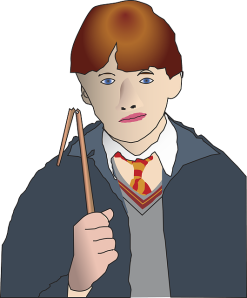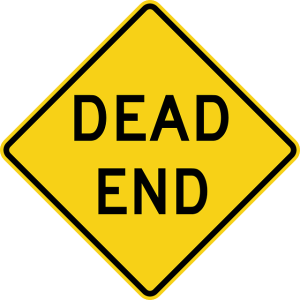Think back to all of the stories you’ve read in the last six months or so. Whether it be full-length novels, short stories, or flash fiction. Now think of the ending of those stories. Were you satisfied with the ending or did you feel cheated? This week we’re going to look at story endings.
Wait, Ron got the girl?!
In J.K. Rowling’s series, Harry Potter, I was surprised to learn that Harry ended up with Ginny Weasley and Ron got Hermione. Although I’d only read the first three books then quit (personal reasons), it was hard not to keep up with the progress of the series as everyone else was talking about it. After seven novels, I’d thought for sure that Harry would get Hermione and that Ron would end up with some background character or no one at all.
My reasoning behind this is that, although the three of them serve as main characters, Harry is the male MC and Hermione, the female MC. Ron was more of a hanger-on and served as comic relief. Mind you, this is strictly my opinion and only based on the first three books. I haven’t seen any of the movies.
My point is, this is an entirely unexpected ending, though not disappointing to me. I’m sure, had I read the rest of the books, the end would justify the means and it would all make sense to me. But not all readers seem satisfied with the way stories end.
But what happens next?
More often then not this question is a positive one, especially if the story is part of a series and the end has a bit of a cliffhanger. In book 2 of my trilogy, The Askinar Towers, I leave the reader with a bit of a shocking end which, I hope, will lead the reader to want to know more and anticipate the release of book 3.
However, when a short story ends a certain way, readers want to know what happens next and, rather than use their own imagination to fill in the missing pieces, they’ll sabotage the writer in the review section of the book stating that they weren’t satisfied.
Two examples of this were after reading short stories from suspense writer, Susan May. A couple of her stories seem to end abruptly but they left the reader with an ending in which a reader could provide their own, “what happens next” moment and be happy with what they take away from them. At least, I did.
In her latest short story, Back Again, Susan’s story is about a woman who travels back to the time her son was killed in a car accident. And each time she goes back, she attempts to alter history so that she might not lose her son. The ending, though sudden, gave both the reader and Dawn, the woman, a sense of hope in her returning each time. That’s all I’ll say about the story, as I don’t want to give away the ending. But I will say this, Susan didn’t write anything in regards to saving the son.
Now going to Amazon, I read a comment from someone who would have given her story five stars had she continued the story and told us, what happened next. I wasn’t happy with the ending myself, but I was satisfied with it.
In another short story called, Scenic Route, the story ended suddenly, but the reader got a sense of completion as far as the suspense. Susan also included the two chapters which came after the official end. These were removed as a suggestion by the editor, and I, for one, agree with that decision. The very next chapter reveals a little too much, if you ask me, thus ruining the suspenseful atmosphere.
In visiting the comments for this story, one person gave her three stars stating that the whole story was convoluted and it involved time travel. As a fan of time travel books and television shows, I didn’t see any sign of time travel. I noted the mysterious tea remedy given which was enough to explain the events that followed but definitely no wibbley wobbley timey wimey stuff.
How NOT to end your stories
Rather than tell you how to end your stories, here’s how not to end it. The Latin phrase, Deus ex machina literally means “God from the machine” and used to indicate “a person or event which provides a sudden, unexpected solution to a story”. (wikipedia) My fellow author, Ciara Ballintyne describes it this way: Deus ex machina refers to endings out of left field that aren’t earned, based on Greek plays where gods sweep in to save the day.
Now, I’d heard the phrase Deus ex machina but wasn’t 100% sure what it meant so I asked her for an example. Here’s her response: Your hero is in a terrible pickle he can’t get out of when his never before mentioned fairy godmother shows up to save him.
She also gave this example in regard to mystery writing: a mysterious stranger handing the hero the last clue he needs for no good reason. If you’re going to set up a sudden solution to your story, the best you can do is mention the source, someway, earlier in the story. This way you’ll have talked about it and it won’t seem like a cheat or dodge to bring your story to a conclusion.
A Final Word about Endings.
Overall, whether you suddenly end your story or tie up all of your loose threads at the end, I would say at least give your reader the satisfaction of having read your story and that it’s now concluded. You won’t please everyone with your ending and I hope no one goes into story writing to please everyone, because everyone is a critic whether good or bad. Tell your story the way you want to, end it the way you need to, and cope with everyone’s reaction.
Writers, how do you end your stories? Readers, do you prefer to have every question answered, or would you rather allow your mind to fill in the blanks? Share your comments with me!
Happy Adventuring!
Chris
Announcement: For the remainder of the month, I hope to have interviews with Indie authors on my blog. I’ve sent several out and am slowly getting them back. I may post more often than Mondays depending on the return. So be on the look out for these upcoming interviews! Subscribe to this blog so you won’t miss a single article or interview.




A well thought out discussion! Thanks for mentioning me 🙂
You’re quite welcome! Thank you for the writing tips!!
Some really good questions raised, and of course there’s the (Ancient Greek) writer’s friend, deus ex machina. Can’t help but respond…
“Readers, do you prefer to have every question answered, or would you rather allow your mind to fill in the blanks?”
As a reader, I’s say it’s somewhere in between. I do need a certain sense of closure to encourage me to pick up another book, though not *everything* needs to be spelled out and solved.
More important than complete closure is what I’d call a ‘warm feeling’ that, on the very last page, makes me say: “You know, I’d sign up for another trip with that bunch of characters.” Or, if it’s a stand-alone novel, that makes me say: “That was so good, I’d happily reach for another one of this author’s books.”
It’s not the same thing as a happy ending, of course – but there has to be something there that made me say, “Yeah, that trip was *worth it*.” 🙂
“Writers, how do you end your stories?”
As a writer, I write what I like to read, so the answer would be the same as above. It’s particularly important if I *don’t* have an unambiguously happy ending…something has to give a feeling like ‘it was worth it’, or ‘at least the farm was saved’, something along that line. For example, James Patterson may drag you through the mind of a serial killer in many of his works, but at the very end (even with a high body count), there is usually a feel that something was accomplished (justice prevailed!) even at a high cost.
In a very bleak world, like one set in noir detective novels (James Lee Burke’s works come to mind) at the end, there is usually just one thin sliver of light in the darkness. Rather like the parable about the man walking along a beach at low tide, where the beach is covered in dying starfish: he can’t save them all, but he *can* save each one that he throws back.
Hello Michael! You bring up some good points! I agree that a lot of readers want everything answered and tied up in a pretty bow. Certain stories could be ruined by that as it would lose the atmosphere it was trying to convey.
Thank you for your comments!
Pingback: The Writer’s Review~Vol. II | Tales From The Fifth Tower